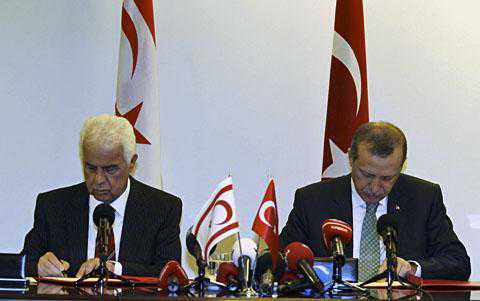Dorian Jones | Istanbul
Turkey has threatened to intervene militarily if the Greek Cypriots continue with their gas exploration plans. The increasingly bitter dispute is now threatening to involve Israel. But the deepening row is now being seen as part of Ankara’s aspirations to become a regional power.

The Turkish Prime Minister Recep Tayyip Erdogan is continuing to ratchet up tensions with Cyprus over its exploration for gas and oil in the Mediterranean. On Wednesday he launched another attack both at Nicosia and the wider international community.
“Greek Cyprus is acting provocatively by drilling, and the institutions whose mission is to protect peace remain silent, he said. Is this the way to solve problems?” Erdogan asked.
Ankara claims any exploration by Nicosia must be done in cooperation with the Turkish Cypriot government, which only Turkey recognizes. That stance has been dismissed by the E.U.
Mr. Erdogan has threatened to send warships to the region, as the diplomatic row continues to deepen. But International relations expert Cengiz Aktar of Istanbul’s Bahcesehir University says Ankara has more than Cyprus in its sites.
“I don’t think its just about Cyprus, it is indeed a show of force and muscle,” said Aktar. “The government feels very confident, even over confident and would like to challenge in particular the state of Israel in the eastern Mediterranean. But do they really know how to go for it, that’s another matter.”
The Israeli dimension
Ankara is a waging a diplomatic war against its former ally Israel over its killing last year of Turkish activists seeking to break Jerusalem’s blockade of Gaza. Since then, Israel has built closer ties with the Greek Cypriot government, signing a protocol last year to explore for energy in the Mediterranean sea.
Turkish Foreign Ministry Under Secretary Selim Yenel acknowledges the dispute with Cyprus involves Israel, too.
“We have heard that there is discussion to have a joint Israeli and Greek Cypriot area. Well that means that there has to be more discussion on this we cannot just accept it unilaterally,” said Yenel.
Greek International relations expert Ioannis Grigoriadis of Ankara’s Bilkent University says such a powerful ally as Israel has emboldened the Greek Cypriots in its stand against Turkey.
“I think they do rely on a kind of Israeli support for the completion of the oil and gas exploration in southeast Mediterranean,” Grigoriadis said. “It appears there is some confidence that Turkey would not be willing to take risk of engaging in a hot conflict with Israel in the southeast Mediterranean.”
Nicosia threatens EU veto
For now neither side appears ready to back down. Nicosia has countered, threatening to veto Turkey’s EU membership bid, but that is seen as empty threat as Ankara’s bid is already at a virtual standstill.
Former Turkish diplomat Sinan Ulgen and a visiting scholar at international diplomacy organization Carnegie Europe, says the present crisis is a sign of Ankara’s new ambitions and the challenge those ambitions present to its western allies.
“This transformation from almost a compliant member of the western community, making Turkey a full EU member, to a assertive ambitious regional power is what we are seeing today,” said Ulgen.
Mr. Erdogan has successfully reached out across North Africa and the Middle East, in his support of the Arab spring. The Turkish Prime Minister has also indicated his country may enforce sanctions against Syria in line with its western allies tough stance against Damascus in its crackdown on dissent.
But observers question whether Mr. Erdogan is aware of the limits of his country’s robust regional foreign policy. Political scientist Aktar.
“Turkey was ignoring superbly the Middle East since 1923, and is discovering the region now. It’s a new comer. Its lack of institutional memory, academic memory does not have enough human resources that really understand and know the region,” said Aktar. “And apparently takes every opportunity to show its force. Show of force is fine, rhetoric is ok. But those who show force, should also know where to stop. Especially to stop short of firing.
Few people are predicting that the present crisis between Turkey and Cyprus will escalate into a full-blown conflict. But with Ankara backing its tough rhetoric with a commitment to an increase naval presence in the region, that risk still remains.
via Is Cyprus Gas Row Feeding Turkey’s Regional Ambitions? | Europe | English. VOA


Leave a Reply